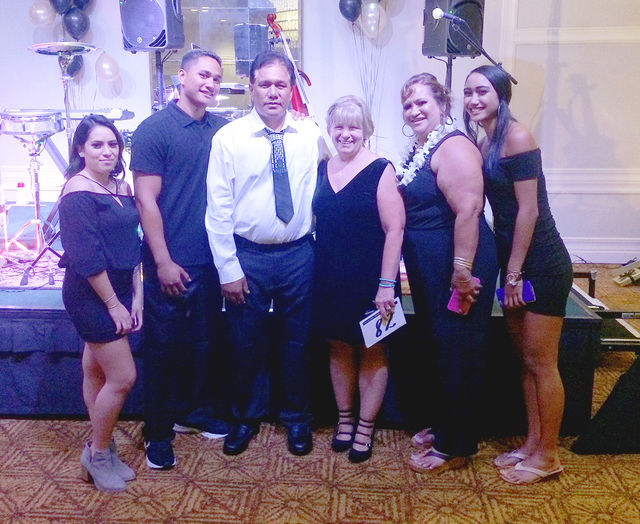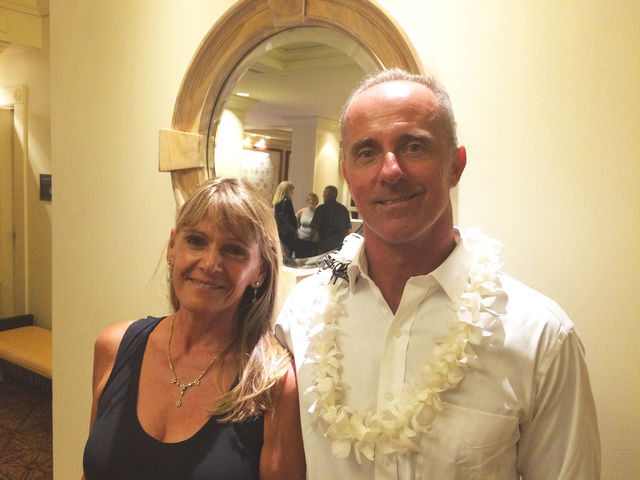As a firefighter of nearly 22 years, Jeff Weiss knows how critical an automated external defibrillator is when it comes to saving lives. He also knows that from when his life was saved five years ago after he collapsed at
As a firefighter of nearly 22 years, Jeff Weiss knows how critical an automated external defibrillator is when it comes to saving lives.
He also knows that from when his life was saved five years ago after he collapsed at Pine Trees on the North Shore.
“I’m proof positive it does work,” the Kapaa fireman said Saturday night at the Rotary Club of Hanalei Bay’s 17th annual Black and White Ball. “I’m trying to pay it back or pay it forward.”
His wife, Cindy Grover, said the AED “was critical” that day when her husband died in her arms, but was revived.
“It saved his life for sure,” she said.
About 200 people attended the gala at the St. Regis Princeville Resort. The event was a fundraiser for the club’s Heart of Gold campaign to install AEDs at key locations around Kauai and on Niihau.
Emcee Dickie Chang led the evening of music, dinner, dancing, auctions and testimonies, all with the goal of raising money and awareness that a quick response can save someone suffering sudden cardiac arrest — while also helping provide the tools.
John Oszust, Rotary Club of Hanalei Bay president, was pleased with Saturday’s gathering of passionate people who wanted to support the club’s efforts to save lives.
What started as a small project to buy two AED units led to the funding for nine AEDs and perhaps more.
“Tonight was a little bit over the top,” he said.
Pamela Foster, a registered nurse, owner of AED Institute and founder of Hawaii Heart Foundation, said sudden cardiac arrest is a leading cause of death. Key for survival is someone recognize what is happening, calling 911 and starting CPR to keep the blood pumping.
“That is going to buy you time until the AED comes,” she said.
Even if someone hasn’t had CPR training, they can do something to help a downed person, Foster said. Survival rates after sudden cardiac arrest in Hawaii are low, she said, because bystanders often don’t react for fear of doing something wrong.
“Don’t just stand there. You can’t hurt them,” Foster told the crowd.
Putting more AEDs in the community will make a difference, she said. They are not complicated, either.
“We’re going to teach people how to use them and we’re going to keep our fingers crossed,” she said. “Those AEDs need to be attached before firefighters arrive.”
Such was the case in July when Charlie Kahepuu collapsed late one night at his Kekaha home. His wife, Jasmine, checked on him and began yelling for help.
That’s when their son, Nohili, charged into the room.
“I heard a thunk, got up, and heard Mom yelling, ‘Something is wrong with Dad,’” he told the crowd as he recounted that night.
His father was face-down on the floor. Nohili turned him over and checked for a pulse. There wasn’t one. His mother called 911.
While Nohili had CPR training, he had never used it on a real person in a real situation. For several minutes, he performed CPR. His dad would catch a breath, then stop breathing. This happened two to three times. Nohili, singing the song, “Stayin’ Alive,” didn’t quit.
“My dad always taught me, never give up,” he said.
About 10 minutes after the call for help, firefighters arrived with an AED. “Clear,” one of them said.
They shocked Charlie twice, and it didn’t work. On the third try, he had a pulse. He would recover.
CPR kept Charlie going and the AED brought him back.
It was, Nohili said, a miracle. He urged people to be ready to offer CPR.
“It could be your dad. You don’t know,” he said.
Charlie spent a week at an Oahu hospital in a coma and two more weeks recovering. Today, his right side is weak and he suffered some memory loss, but otherwise, he is feeling good.
“Thanks to my son,” the 57-year-old said, smiling.
Nohili, Jasmine said, is a humble man and had never publicly shared his story of that night until Saturday.
“Nohili was the guy who saved Dad’s life,” she said.
‘He died in my arms’
Weiss, a firefighter who prides himself on being in excellent physical condition, said he was the last guy you would expect to face sudden health issues. He bikes to work from his Anahola home, loves to surf and paddle.
But on May 28, 2011, after a day that included of water activities with the family around Pine Trees, he hadn’t been feeling good. He was leaning against their truck when he suddenly went down and stopped breathing.
“He died in my arms,” Cindy said. “He was completely gone.”
Their daughter, Alia, called 911. Meanwhile, Cindy began CPR and then a cardiac nurse who happened to be there took over the CPR. Lifeguards overheard the radio transmission for help and hurried to the scene with an AED within minutes.
Cindy said she kept yelling at her husband: “Stay here. Don’t leave me.”
He didn’t.
Jeff was revived once on the beach. They put him in the ambulance, where he coded again. They shocked him again, and he came back again.
“Tom, get off me. You can stop doing CPR,” he said to his friend, an EMT on duty. “I’m back.”
He recalled asking if his wife was in the front seat. Told she was, he said, “Tell her I’m OK.”
Cindy was thrilled the father of their seven children survived.
“It was an incredible blessing,” she said.
Jeff took a month off from work but passed a treadmill test by running it to the maximum before returning to being a firefighter. He still paddles, bikes to work and surfs the big waves in Hanalei. He said doctors couldn’t say for sure what caused the sudden cardiac arrest, but he knows for certain that a few things worked in his favor that day.
“I made it through the day because of early CPR, early advanced defibrillation and early advanced care,” he said. “I’m still doing my best to save lives.”
He said once someone suffers sudden cardiac arrest, time becomes critical.
“Tick tock. Time is clicking by,” he said.
There’s the 911 call. Dispatch calls medical personnel. They respond, but that response can depend on where the scene is and what traffic is like on the way there.
“If we get to the scene and there’s been no treatment (CPR), our success rate is really low,” he said.
There’s not a lot of room for improvement in response time, he said.
“If we get there, if someone has been doing CPR, our chances are better. We have a shot. We’re going to save this person,” he said.
If there is an AED nearby and someone uses it, better yet, which is why Weiss shared his story Saturday.
He supported the club’s efforts to have AEDs available around the island because it could save lives.
“They have a road map to success and this is it, right here,” he said. “I hope you guys realize what a real thing this is.”



